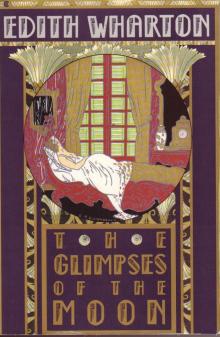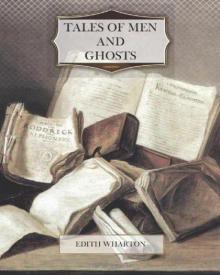- Home
- Edith Wharton
Fast and Loose Page 2
Fast and Loose Read online
Page 2
Chapter III
Jilted
——— “There can be no reason
Why, when quietly munching your dry-toast & butter
Your nerves should be suddenly thrown in a flutter
At the sight of a neat little letter addressed
In a woman’s handwriting.” Robert Lytton: Lucile.
Guy Hastings was finishing an unusually late breakfast at his favourite resort in London, Swift’s Club, St. James St., on the morning after his parting with Georgie, when a note addressed in her well-known hand, with its girlish affectation of masculiness, was handed to him by a Club servant. Although he was surprised that she should have written so soon, (she seldom, during his trips to London, wrote to him at all) he was not excited by any stronger emotion than surprise & slight curiosity, for the words that passed between them the day before had appeared to him nothing more than a lover’s quarrel developed by bad weather & ennui & he was too well accustomed to unaccountable phases in his cousin’s April character to imagine that anything serious could be its consequence. A man, however, who is as deeply in love as Guy was, does not have a letter in the beloved one’s handwriting long unopened; & though a pile of other envelopes “To Guy Hastings Esqr.” were pushed aside until fuller leisure after breakfast, he broke Georgie’s seal at once. One glance at the hurriedly written lines sufficed to change the aspect of life completely. At first there came a sense of blank bewilderment, followed, upon reflection, by indignation at this undeserved slight; & these emotions combined were enough to make him turn from the breakfast-table, thrusting the package which contained the ring into his breast-pocket, to escape from the clatter & movement of the breakfast room. One might have supposed that every member of the club would be off shooting, fishing, hunting or travelling at this unfashionable time, but of course, as Guy went down to take refuge in the reading-room he was fastened upon by a veteran club bore, who talked to him for half an hour by the clock, while all the time Georgie’s note was burning in his pocket. At last the bore discovered that he had an engagement, & with deep regret (more for Guy’s sake than his own) was obliged to break off in the midst of an Indian anecdote; but he was replaced almost immediately by Capt. Doublequick of the ____th, who always had a new scandal to feast his friends on, & now for dearth of listeners, came to tell Guy the fullest details of “that affair with young Wiggins & the little French Marquise.” This delectable history, embellished with the Capt.’s usual art, lasted fully another half hour; & Guy was in the last stages of slow torture when the unconscious Doublequick espied a solitary man at the other end of the room who had not heard all about “young Wiggins.” Left to himself, Guy, with the masculine instinct of being always as comfortable as possible, settled himself in an armchair, & reread Georgie’s note, slowly, carefully & repeatedly, as though he fancied it might be an optical delusion after all. But it was one of Georgie’s virtues to write a clear hand. The cruel words were there, & remained the same, read them as he would. At last, as he sat half-stupidly staring at the few lines, a purpose formed itself within him to write at once & ask the meaning of them. Think as he would, he could not remember having, by word or act, justified Georgie in sending him such a letter; & he concluded that the best thing & the simplest he could do, was to demand an explanation. He loved her too deeply & reverently to believe that she could mean to throw him over thus; he thought he knew the depths & shallows of her character, & though he was not blind to her faults, he would never have accused her, even in the thought, of such unwarranted heartlessness. Having determined, then, on this first step, he called for pen & paper, & after tearing up several half-written sheets, folded & sealed this letter.
What have I done to deserve the note I got from you this morning? Why do you send the ring back? God knows I love you better than anyone on earth, & if I am at fault, it is ignorantly. If you have found out you don’t care for me, tell me so—but for Heaven’s sake don’t throw me over in this way without a word of explanation. G.H.
Miss Rivers. Holly Lodge, Morley-near-W. Adamsbro.
Every one of those few words came straight from Guy’s heart; for Georgie Rivers had been his one “grande passion,” & his love for her perhaps the noblest, strongest feeling he was capable of. Indeed, I am disposed to think that the life of “a man about town” (the life which Guy had led since his college days five years before) is apt to blunt every kind of feeling into a well-bred monotone of ennui, & it is a wonder to me that he had preserved so strong & intact the capacity of really “falling in love.” Of course, he had had a dozen little affaires de cœurs here & there before his heart was really touched; a man who lives as fast & free as Guy Hastings had done, seldom escapes without “the least little touch of the spleen”—but he had outgrown them one after another as people do outgrow those inevitable diseases, until the fatal malady seized him in the shape of his pretty cousin. His love for her had influenced his whole life, & blent itself into his one real talent, for painting, so that he sketched her bewitching little head a thousand & one times, & looked forward in the future, after his marriage, to turning his brush to account, selling his pictures high, &, in the still dimmer To-be becoming an R.A. How many an idle amateur has dreamed in this fashion! Meanwhile, he had enjoyed himself, made love to her, & lived neither better nor worse than a hundred other young men of that large class delightful for acquaintance, but dangerous for matrimony, whom susceptible young ladies call “fascinating” & anxious mothers “fast.” Now, though like takes to like, it is seldom that two people of the same social tastes fall in love with each other; Mr. Rapid, who has been in all the escapades going, & connected with a good many of the most popular scandals, is attracted by Miss Slow, just out of a religious boarding-school, with downcast eyes & monosyllabic conversation; Miss Rapid, who has always been what Punch calls “a leetle fast,” settles down to domesticity with good, meek-minded Mr. Slow. Such is the time-honoured law of contrasts. But Guy Hastings & Georgie were one of those rare exceptions said to prove the rule which they defy. If Guy had tasted the good things of life generously, his cousin was certainly not wanting in a spice of fastness. Yet these two sinners fell mutually in love at first sight, & remained in that ecstatic condition until Georgie’s unaccountable note seemed to turn the world temporarily upside-down. That unaccountable note! After answering it & calling for a servant to post his answer, he thrust it away in his pocket, & since “there was no help for it,” resolved to make the best of the matter by forgetting it as quickly as possible. There are few young men who do not turn with an instinct of abhorrence from the contemplation of anything painful; & some possess the art of “drowning dull care” completely. Guy, however, could not shake his disagreeable companion off; & he must have shewed it in his face, for as he was leaving the club, in the forlorn hope of finding some note or message from Georgie at his rooms, a familiar voice called out “Hullo, Guy Fawkes, my boy! I didn’t know you were in town! Had a row? What makes your mustachios look so horridly dejected?” “Jack Egerton!” exclaimed Guy, turning to face the speaker, a short, wiry-built little man with reddish whiskers & honest gray eyes, who laid a hand on his shoulder, & gravely scanned him at arm’s length. Guy laughed rather uneasily. No man likes to think that another has guessed his inmost feelings at first sight. “Yes,” said Egerton, slowly, “your Fortunatus purse has run out again, & Poole has too much sense to send that blue frock coat home, or you’ve had a row about some pretty little votary of the drama, & been O jolly thrashed—or—Araminta, or Chloe or Belinda (we won’t say which) has been shewing you some charming phase in her character usually reserved for post-nuptial display. Come now, Knight of the Dolorous Visage, which is it?” Jack Egerton (commonly called Jack-All, from his wonderful capacity for doing everything, knowing everybody & being everywhere) although by some years Guy’s senior, had known him at Cambridge (poor Jack was there through several sets of new men) & had struck up a warm friendship with him which nothing since had shaken. Egerton shared Guy’s artistic
inclinations, & was like him “a man about town,” & a general favourite, so that the similarity of their life had thrown them together ever since they forsook the shade of Alma Mater, Jack steering the “young Duke” as he always called Guy, out of many a scrape, & Guy replenishing Jack’s purse when his own would allow of such liberality. Guy then, who would not have betrayed himself to any other living man, found it a great relief to unburden his woes to Jack Egerton, knowing that he possessed the rare talent of keeping other people’s secrets as jealously as his own. “Hang it, there is a row,” said the lover, pulling the dejected moustache. “But for Heaven’s sake come out of this place. We shall be seized upon by some proses in a minute. Come along.” He ran his arm through Egerton’s, & the two sallied forth into the streets, making for the deserted region of Belgravia. It was not until they were in the most silent part of that dreary Sahara between the iron railings of a Duke who was off in Scotland, & the shut windows of an Earl who had gone to Italy, that Jack, who knew his companion “au fond,” broke the silence by, “Well, my boy?” Guy glared suspiciously at a dirty rag-picker who was expressing to himself & his ragbag the deepest astonishment “that them two young swells should be ‘ere at this time o’ year”; but even that innocent offender soon passed by, & left him secure to make his confession in entire privacy. “Look here” he said, taking Georgie’s note from his pocket & handing it to Egerton. (Although the engagement between them, which had been of short duration, was kept private, he was shrewd enough to guess that his friend knew of it.) Jack, leaning against the Duke’s railings, perused the short letter slowly; then folded it up & relieved himself by a low whistle. “Well?” groaned Guy, striking his stick sharply against His grace’s area-gate, “What do you think of that? Of course you know that we were engaged, & she always said she cared for me, & all that—until that thing came this morning.” Jack looked meditatively at his friend. “I beg pardon,” he said, slowly, “but did you have a row when you last saw her?” “No, upon my honour none that I was conscious of! It was yesterday—beastly weather, you remember, & we were a little cross, but we made it up all right—at least, I thought so.” “Of course you thought so,” said Jack, calmly; “The question is, who provoked the quarrel?” “God knows—if there was a quarrel—I did not. I would go to the ends of the earth for her, Jack!” “Then—excuse me again, old boy—then she tried to pick a quarrel?” Guy paused—it seemed treason to breathe a word against his lady, & yet he could not but recall how strange her behaviour had been—“I—I believe I bored her,” he stammered, not caring to meet Jack’s eyes. “Did she tell you so?” “Well—yes; but, you know, she often chaffs, & I thought—I thought…” “You thought it was a little love-quarrel to kill time, eh?” said Jack, in his short, penetrating way. “Well, my dear boy, so it might have been, but I don’t think it was.” “What do you think then?” said Guy, anxiously. “Don’t be afraid to tell me, old fellow.” “Look here, then. You are a handsome young gaillard—just the sort that women like, the worse luck for you!—& I haven’t a doubt your cousin (she shall not be named) fell in love with you. But—taking a slight liberty with the proverb—“fall in love in haste, repent at leisure”—How much have you got to support a wife on?” “Deucedly little,” said Guy, bitterly. “Exactly. And you like to live like a swell, & have plenty of money to pitch in the gutter, when society requires it of you. Now, I dare say your cousin knows this.” “Well?” “Well—& she has more good sense & just as much heart as most young ladies of our advanced civilization. She has had the wit to see what you, poor fool, sublimely overlooked—that what is comfort for one is pinching for two (or—ahem! three)—& the greater wit to tell you so before it is too late.” Jack paused, & looked Guy directly in the face. “Do you understand?” “I don’t know…I…for Heaven’s sake, Jack, out with it,” groaned the lover. Jack’s look was of such deep, kindly pity as we cast on a child, whom we are going to tell that its goldfish is dead or its favourite toy broken. “My poor boy,” he said, gently, “don’t you see that you have been—jilted?”—
Chapter IV
The End of the Idyl
“Through you, whom once I loved so well—
Through you my life will be accursed.”
Georgie had just come home from a ride to the meet with Lord Breton, on the day after her engagement to that venerable peer, when her mother called to her that there was a letter on her table upstairs in Guy’s handwriting. Georgie changed colour; she had not expected this, & had thought to cast off “the old love” more easily. It came now like a ghost that steals between the feaster & his wine-cup; a ghost of old wrongs that he thought to have laid long ago but that rises again & again to cast a shadow on life’s enjoyments. Georgie, however, determined to take the bull by the horns, & went up to her room at once; but she paused a moment before the pier-glass to smile back at the reflection of her trim figure in the dark folds of a faultless habit, & crowned by the most captivating little “topper” from under which a few little brown curls would escape, despite the precaution which Georgie of course always took to brush them back into their place. Then, setting her saucy, rosebud mouth firmly, she turned from the glass & opened Guy’s letter. If she had not been very angry at his having written at all, she might have been in danger of giving Lord Breton the slip, & coming back to her first choice; for she did love Guy, though such a poor, self-despising thing as love could have no legitimate place in the breast of the worldly-wise Miss Rivers! But she was angry with Guy, & having read his appeal tore it up, stamped her foot & nearly broke her riding-whip in the outburst of her rage. After that, she locked her door, & threw herself into what she called her “Crying-chair”; a comfortable, cushioned seat which had been the confidante of many a girlish fit of grief & passion. Having cried her eyes into the proper shade of pinkness, all the while complaining bitterly of Guy’s cruelty & the hardness of the world, & her own unhappy fate, she began to think that his letter must nevertheless be answered, & having bathed her injured lids and taken an encouraging look at Lord Breton’s ruby flashing on her left hand, she wrote thus:

 The Age of Innocence
The Age of Innocence The Reef
The Reef Summer
Summer The Glimpses of the Moon
The Glimpses of the Moon Xingu
Xingu The Fruit of the Tree
The Fruit of the Tree Fast and Loose
Fast and Loose Artemis to Actaeon and Other Verse
Artemis to Actaeon and Other Verse The Line of Least Resistance
The Line of Least Resistance The Lamp of Psyche
The Lamp of Psyche The Reckoning
The Reckoning Afterward
Afterward The New York Stories of Edith Wharton
The New York Stories of Edith Wharton The 2014 Halloween Horrors Megapack
The 2014 Halloween Horrors Megapack 'Copy': A Dialogue
'Copy': A Dialogue The Recovery
The Recovery The Fulness of Life
The Fulness of Life Early Short Stories Vol. 1
Early Short Stories Vol. 1 Tales of Men and Ghosts
Tales of Men and Ghosts The House of the Dead Hand
The House of the Dead Hand That Good May Come
That Good May Come The Buccaneers
The Buccaneers Other Times, Other Manners
Other Times, Other Manners The Hermit and the Wild Woman
The Hermit and the Wild Woman Kerfol
Kerfol The Duchess at Prayer
The Duchess at Prayer Bunner Sisters
Bunner Sisters The Choice
The Choice Madame De Treymes
Madame De Treymes Ethan Frome, Summer, Bunner Sisters
Ethan Frome, Summer, Bunner Sisters In Morocco
In Morocco The Valley of Decision
The Valley of Decision Age of Innocence (Barnes & Noble Classics Series)
Age of Innocence (Barnes & Noble Classics Series) The Angel at the Grave
The Angel at the Grave April Showers
April Showers Sanctuary
Sanctuary The Bunner Sisters
The Bunner Sisters Mrs. Manstey's View
Mrs. Manstey's View Writing a War Story
Writing a War Story The Custom of the Country
The Custom of the Country In Trust
In Trust The Triumph of the Night
The Triumph of the Night The Hermit and the Wild Woman, and Other Stories
The Hermit and the Wild Woman, and Other Stories Roman Fever and Other Stories
Roman Fever and Other Stories The Mission of Jane
The Mission of Jane The Descent of Man and Other Stories
The Descent of Man and Other Stories Coming Home
Coming Home The Touchstone
The Touchstone Early Short Stories Vol. 2
Early Short Stories Vol. 2 Edith Wharton's Verse, 1879-1919, from various journals.
Edith Wharton's Verse, 1879-1919, from various journals.